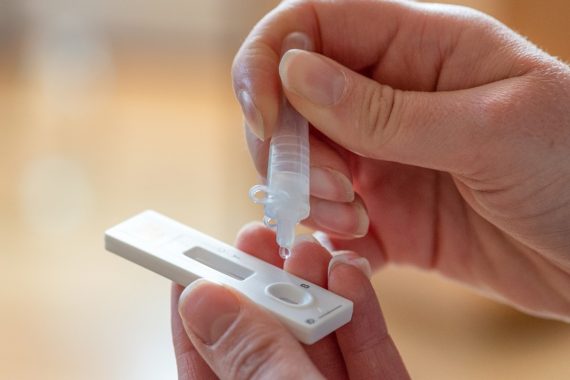Covid asymptomatic GPs with positive day 10 LFTs can return to work

GPs and practice staff who are asymptomatic but still returning a positive LFT result on day 10 of their Covid isolation period should be risk assessed to return to work, according to new guidance.
The move is designed to mitigate high levels of staff absences, with more than one in five doctors (21%) self-isolating in the last two weeks according to a snapshot survey by the BMA.
An NHS England letter sent to practices over the weekend confirmed that new UK Health Security Agency (UKHSA) guidance temporarily suspending confirmatory PCR tests following positive LFTs also applies to healthcare staff.
Under the general UKHSA guidance, which comes into force from tomorrow, those testing positive for Covid via LFT will be required to self-isolate immediately without needing a confirmatory PCR.
Those with symptoms must still take a PCR test and self-isolate while awaiting the result and if it returns positive – whether or not they test negative via LFT.
Those who continued to test positive on day 10 were asked to continue daily lateral flow testing and not return to work until they received a negative test result.
However, NHS England said that healthcare staff who continue to test positive via LFT on day 10 should now be risk assessed ‘with a view to return to work’ if they are asymptomatic.
The letter said: ‘Building on UKHSA advice, if the staff member’s LFD test result is positive on the 10th day AND the person has no symptoms, they should have a local risk assessment with a view to return to work depending on the work environment.
‘We are aware that with current staff absence levels, organisations will at times need to risk assess isolating staff to allow them to return to work on a balance of risk basis (for those who remain LFD positive on or after day 10).’
The likelihood of a positive LFT after 10 days in the absence of symptoms is ‘very low’, it added.
UKHSA’s guidance for healthcare professionals has been updated to reflect the new advice.
UKHSA guidance for healthcare professionals
The likelihood of a positive LFD test in the absence of a high temperature after 10 days is low. If the staff member’s LFD test result is positive on the 10th day, they should continue to take daily LFD tests, and can return to work after a single negative LFD test result.
The likelihood of a positive LFD test after 14 days is considerably lower. If the staff member’s LFD test result is still positive on the 14th day, they can stop testing and return to work on day 15. If the staff member works with patients or residents who are especially vulnerable to COVID-19 (as determined by the organisation), a risk assessment should be undertaken, and consideration given to redeployment.
Managers can undertake a risk assessment of staff who test positive between 10 and 14 days and who do not have a high temperature, with a view to them returning to work depending on the work environment.
Source: UKHSA
NHS England also said that as well as reporting positive LFTs for contact tracing, healthcare staff should report their absence ‘in line with the employer’s sickness absence policy’.
It comes as GPs are to report Covid staff absences via a new tracker tool due to launch this week, amid soaring absences that have seen 95% of practices experiencing much higher levels of staff off sick than usual.
The letter added that primary care organisations should ‘continue’ one-to-one conversations with staff who have refused Covid jabs to ‘understand and address their questions and concerns’.
All staff should continue to carry out and report results of twice-weekly LFTs, alongside ‘robust local monitoring’ of test results, and should be offered ‘continuous learning’ regarding the latest IPC guidance including via ‘refresher’ events, it said.
NHS England last month told GP practices they can access a ‘significant contingency supply’ if they are struggling to get hold of tests.
It followed the announcement that the Government would ‘double’ capacity for Covid testing after days of problems.
Meanwhile, GPs and practice staff were last month told that if they are fully vaccinated, they no longer need to isolate for 10 days if they are a close contact of an Omicron Covid case, unless they test positive or develop symptoms.
Click to complete relevant Covid-19 CPD modules on Pulse Learning.
Groups exempt from temporary suspension of confirmatory PCRs
- Those eligible for financial support for self-isolation via the £500 Test and Trace Support Payment (TTSP)
- Those participating in research or surveillance programmes in some cases, according to the research or surveillance protocol
- Around one million vulnerable people in England identified as being potentially eligible for new Covid treatments, who will receive priority PCR home testing kits by mid-January for use if they develop symptoms or test positive via LFT
Source: NHS England
Related Articles
READERS' COMMENTS [1]
Please note, only GPs are permitted to add comments to articles










Asymptomatic GPs with positive day 10 LFDs should be ware of GMC advice that they must not cause harm to patients from their own medical condition, and that LFD positivity may indicate a rise in transmission risk above the 6% risk at day 10 for LFD negative doctors, possibly to as much as 13%, though the PHW line is that LFD positivity is a ‘very good’ marker for infectivity !
Return to work in Wales is conditional on a Risk Assessment compiled according to employer or HB guidelines, and is not the same as legal isolation period.